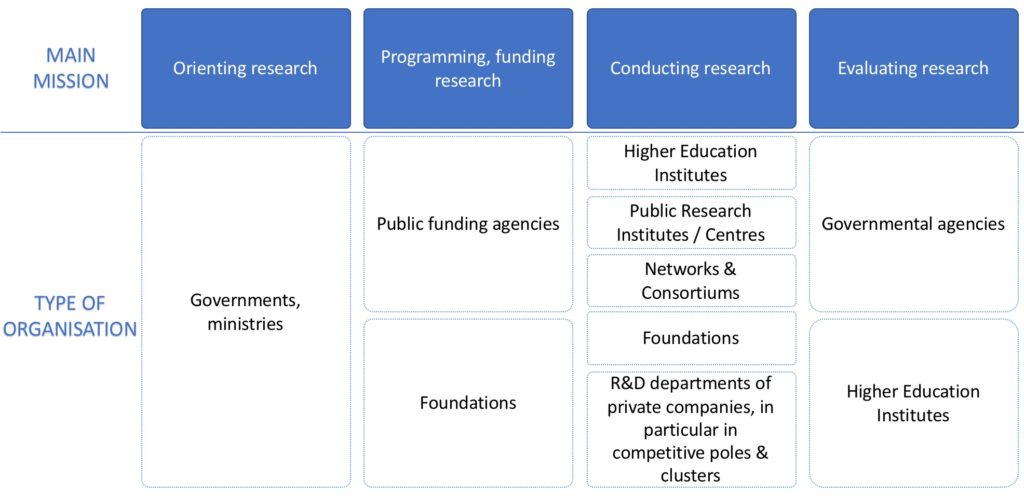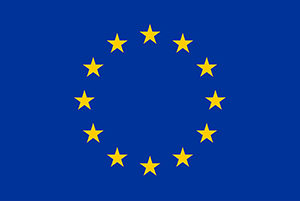
Many organisations related to higher education and research exist. When researching research, it is essential to be aware that research organisations are part of a system and can be influenced not only directly by policies but also indirectly as members of such a system. It is essential to be able to understand the individuality of a research organisation but also to have a grasp of its place in the system and its relations with its stakeholders.
The varieties of geographical and political spaces as well as organisational juridical statuses that exist encourage the proliferation of organisations, such as networks of universities or intermediary organisations that foster collaborations. Sometimes, these organisations’ missions overlap. Higher education and research systems are thus closely connected. They are often regulated by the same governmental entities, for example ministries of many European countries such as the United Kingdom, France, Sweden, Germany. The two systems however differ: for instance, some organisations can conduct research without teaching, such as research institutes. There are certain other countries that choose to gather research with innovation and/or industry, rather than with education, Spain for example. This is a political choice, that obviously has an influence on the implementation of policies in one system or another.
In order to have an overview of the different types of organisations involved in a research system and what links them, I attempted to sketch a simplified map, or classification, based on the French model. The French Ministry of Higher Education, Research and Innovation describes the French research system on its website. Four main missions of organisations in the French research system are listed, that I use as a basis for the classification below:
- Orienting the research: defining the priority areas to explore, or the main problems to solve;
- Programming the research: granting funds to research projects in accordance to the priority areas and criteria previously defined;
- Conducting the research;
- Evaluating the research and its results.
The classification seems to be relevant for the Swedish research system as well.
This tool enables to have an overview of an entire research system. It also enables to notice the variety of types of organisations, and maybe understand the causes for such a variety. It enables to identify the main mission of a specific organisation more easily. This is especially helpful when analysing data collected from this specific organisation: the main mission certainly has an influence on what data is communicated and under what form. The tool also perhaps permits to spot potential gaps or faults in the system. In the cases of the EU and Sweden, the same organisations are both involved in the orientation and the evaluation of research (respectively the European Commission and the Swedish Research Council): can this create a fault, through some bending research, such as in France? In the first case, there could be a risk of conflict of interests, but in the second exists the risk that the evaluating organisation could neglect the expectations of the orienting organisation.
This tool raises several other questions, open for discussion. One can wonder how the links between the listed organisations of the system can be defined: are they hierarchical, or causal? Do they really all share the same vision, follow the same Ariadne’s string?
Classification of the organisations of a research system

Examples of the different types of organisations
| Type of organisation | European Union | France | Sweden |
| Governments, ministries | European Commission | Ministère de l’Enseignement Supérieur, de la Recherche et de l’Innovation (MESRI) (Ministry of Higher Education, Research and Innovation); advised by Conseil Supérieur de la Recherche et de la Technologie (CSRT) (Higher Council of Research and Technology) | Utbildningsdepartementet (Ministry of Education and Research); advised by Vetenskapsrådet (Swedish Research Council) |
| Public funding agencies | European Research Council (ERC) | Agence Nationale de la Recherche (ANR) (National Research Agency); BPI France (Public Investment Bank) | VINNOVA; Forskningsrådet för arbetsliv, hälsa och välfärd (Forte) (Swedish Research Council for Health and Working Life); Forskningsrådet för hållbar utveckling (Formas) (Swedish Research Council for Sustainable Development); |
| Foundations | e.g. Fondation pour la Recherche Médicale (Foundation for Medical Research) | e.g. Stiftelsen för Strategisk Forskning (SSF) (Swedish Foundation for Strategic Research); | |
| Higher Education Institutes | – | Universities (e.g. Université Grenoble Alpes); Grandes Ecoles (e.g. Grenoble Ecole de Management); National Superior Schools (e.g. ENS Cachan); Specialised schools (e.g. Ecole Nationale des Chartres) | Universities (e.g. Linköpings Universitet); Högskolar (specialized schools) |
| Public Research Institutes / Centres | – | e.g. Centre National de la Recherche Scientifique (CNRS) (National Centre for Scientific Research); Centre National d’Etudes Spatiales (CNES) (National Centre for Spatial Studies); Commissariat à l’Energie Atomique et aux Energies Alternatives (CEA) (Alternative Energies and Atomic Energy Commission); Institut National de Recherche dédié au Numérique (INRIA) (National Institute dedicated to Digital Technology) | Research Institutes of Sweden (RISE) |
| Networks & Consortiums | e.g. League of European Research Universities (LERU); | e.g. Communautés d’Universités et d’Etablissements (COMUE) (Communities of Universities) | e.g. Svenska Nätverket för Europaforskning i Ekonomi (SNEE) (Swedish Network for European research in economy) |
| Foundations | – | e.g. Institut Marie Curie | – |
| R&D departments of private companies, in particular in competitive poles & clusters | – | e.g. Airbus at Aerospace Valley | e.g. Ericsson at Kista Science City |
| Governmental evaluating agencies | European Commission | Haut Conseil de l’Evaluation de la Recherche et de l’Enseignement Supérieur (HCERES) | Universitets Kanslers Ämbetet (UKÄ) (Swedish Higher Education Authority) with Vetenskapsrådet (Swedish Research Council) |
For more information on the French research system: http://www.enseignementsup-recherche.gouv.fr/cid56382/organisation-du-systeme-de-recherche-et-d-innovation.html
For more information on the funding of research in Sweden: http://www.regeringen.se/regeringens-politik/hogskola-och-forskning/finansiering-av-forskning-i-sverige/


